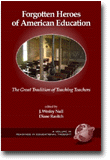
Forgotten Heroes of American Education
The Great Tradition of Teaching Teachers
Edited by:
J. Wesley Null, Baylor University
Diane Ravitch, New York University
A volume in the series: Readings in Educational Thought. Editor(s): Chara Haeussler Bohan, Georgia State University. Perry L. Glanzer, Baylor University. Andrew J. Milson, University of North Texas. J. Wesley Null, Baylor University.
Published 2006
This book is titled Forgotten Heroes of American Education because it contains representative writings by significant educators who challenged mainstream thinking. The editors of this volume believe that the work of these thoughtful and important educators deserves to be remembered. They have been forgotten because in the great pedagogical battles of the twentieth century, they lost. Time and again, they battled with their Progressivist colleagues over the purpose and goals of elementary and secondary education. Because they lost the arguments, their role as leaders and thinkers was almost completely ignored by historians of education, who identified with the winners. We think this was a grand mistake. To honor the legacy of these eight educators, we have written this book and entitled it Forgotten Heroes of American Education.
CONTENTS
Foreword by Ravitch; Introduction by Null; William C. Bagley, 1907, Craftshmanship in Teaching; 1904, Ideals Versus Generalized Habits; 1907, The School’s Responsibility for Developing the Controls of Conduct; 1908, Optimism in Teaching; 1908, The Ideal Teacher; 1909, Education and Utility; 1910, The Scientific Spirit in Education; 1913, The Future of the Training of Teachers; 1916, Some Handicaps to Education in a Democracy; 1918, The Distinction Between Academic and Professional Subjects; 1918, Education and our Democracy; 1918, The Status of the Classroom Teacher; 1921, The Nation’s Debt to the Normal Schools; 1921, Projects and Purposes in Teaching and Learning; 1922, Preparing Teachers for the Urban Service; 1924, The Army Tests and the Pro-Nordic Propaganda; 1928, What is Professionalized Subject-Matter?: A Statement and Brief Development of Thesis; 1929, The Profession of Teaching in the United States; 1929, The Teacher’s Contribution to Modern Progress; 1930, Teaching as a Fine Art; 1930, The Upward Expansion of Mass Education: Its Causes and Some of the Problems That It Has Raised; 1933, What Does The Dominant American Theory of Education Imply for the Redirection of the Professional Education of Teachers?; 1933, The Ideal Preparation of a Teacher of Secondary Mathematics from the Point of View of an Educationist; 1933, Modern Educational Theories and Practical Considerations; 1936, Some Master Teachers I Have Known; 1938, Are the Essentialists the True Progressives?; 1938, Teachers’ Rights, Academic Freedom, and the Teaching of Controversial Issues; 1939, Basic Problems in Teacher Education; 1941, Latin from an Educationist’s Point of View; 1946, A ’Realistic’ Attitude Toward the Teachers-College Problem; Charles DeGarmo, 1907, Social Aspects of Moral Education; David Felmley, 1914, The Reorganization of the Normal-School Curriculum; William Torrey Harris, 1879, The Science of Education; 1890, University and School Extension; 1896, Educational Values; 1897, The Relation of School Discipline to Moral Education; 1899, A Brief for Latin; 1899, The Future of the Normal School; Isaac L. Kandel, 1929, The Influence of Dewey Abroad; 1936, Is the New Education Progressive?; 1939, Prejudice the Garden Toward Roses?; 1940, Address at St. Paul’s Chapel, Columbia University; 1940, The Profession of Teaching; 1941, The Fantasia of Current Education; 1943, Selection from The Cult of Uncertainty; 1959, Character Formation: A Historical Perspective; 1960, Revival of American Education; Charles Alexander McMurry, 1880, How to Conduct the Recitation; 1894, Special Method for Literature and History in the Common Schools; 1897, Selection from The Elementary Schools and Civic Education; 1925, Practical Teaching; William C. Ruediger; 1912, The Present Status of Education as a Science; Edward Austin Sheldon, 1862, Selection from A Manual of Elementary Instruction; John Dewey’s Forgotten Essays, 1896, Pedagogy as a University Discipline; 1903, The Relation of Theory to Practice in the Education of Teachers; 1926, Individuality and Experience; 1930, How Much Freedom in New Schools? Index. About the Editors.
-
Paperback978-1-59311-447-3
Web price: $62.04 (Reg. 72.99)
-
Hardcover978-1-59311-448-0
Web price: $89.24 (Reg. 104.99)
- eBook9781607525189

- EDU037000 - EDUCATION: Research
- EDU015000 - EDUCATION: Higher
- EDU029020 - EDUCATION: TEACHING METHODS & MATERIALS: Reading & Phonics
-
 American Educational Thought - 2nd Ed.
Essays from 1640-1940
American Educational Thought - 2nd Ed.
Essays from 1640-1940
-
 Clinical Teacher Education
Reflections From an Urban Professional Development School Network
Clinical Teacher Education
Reflections From an Urban Professional Development School Network
-
 From a Gadfly to a Hornet
Academic Freedom, Humane Education, and the Intellectual Life of Joseph Kinmont Hart
From a Gadfly to a Hornet
Academic Freedom, Humane Education, and the Intellectual Life of Joseph Kinmont Hart
-
 Paul Diederich and the Progressive American High School
Paul Diederich and the Progressive American High School
-
 Promoting Equitable Classroom Practices in Higher Education
Approaches Beyond Curriculum
Promoting Equitable Classroom Practices in Higher Education
Approaches Beyond Curriculum
-
 Readings in American Educational Thought
From Puritanism to Progressivism
Readings in American Educational Thought
From Puritanism to Progressivism
-
 The Handbook for Aspiring Higher Education Leaders
The Handbook for Aspiring Higher Education Leaders

